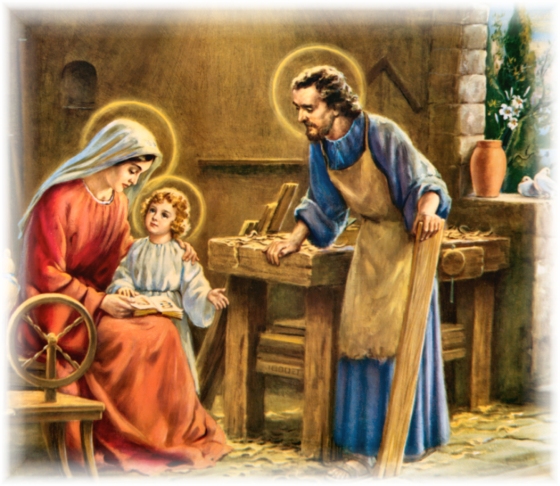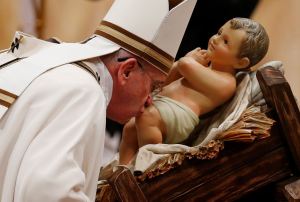THE HOLY FAMILY OF NAZARETH AND THE CHRISTIAN FAMILY
(A biblical reflection on the Feast of THE HOLY FAMILY – Sunday, 28 December 2014)
Gospel Reading: Luke 2:22,39-40
First Reading: Genesis 15:1-6; 21:1-3; Psalms: Psalm 105:1-6,8-9; Second Reading: Hebrews 11:8,11-12,17-19; Gospel Reading: Luke 2:22-40 (longer version)
The Scripture Text
And when the time came for their purification according to the law of Moses, they brought Him up to Jerusalem to present Him to the Lord.
And when they had performed everything according to the law of the Lord, they returned into Galilee, to their own city, Nazareth. And the Child grew and became strong, filled with wisdom; and the favor of God was upon Him. (Luke 2:22,39-40 RSV)
At the beginning and the end of this passage about the Holy Family, Luke mentions that Mary and Joseph were observing the Law of the Lord. Clearly, here was a family where God was number one and everything was evaluated in the light of faith. They belonged to the larger family of the Jewish religion and their faith was supported by religious customs and ritual.
 After eight days every male child was circumcised in observance of the ancient covenant between God and Abraham, the father of believers. In the case of a firstborn male a sacrificial offering was rendered to God as the source of all life. Then after forty days they had the ritual of purification of the mother which restored her to participation in religious service. Through the observance of these religious traditions the faith of the people was supported and the sacredness of life was kept in the forefront. The place of God in the family was deeply respected.
After eight days every male child was circumcised in observance of the ancient covenant between God and Abraham, the father of believers. In the case of a firstborn male a sacrificial offering was rendered to God as the source of all life. Then after forty days they had the ritual of purification of the mother which restored her to participation in religious service. Through the observance of these religious traditions the faith of the people was supported and the sacredness of life was kept in the forefront. The place of God in the family was deeply respected.In our present time when there is a great push towards the secularization of society, the Law of the Lord is disregarded by many in the debates on family morality. Secularism is a pattern of thought and behavior which seeks to set humanity on a pedestal apart from God. Echoes of the first temptation can be heard: “… and you will be like God, knowing good and evil” (Genesis 3:5 RSV) … having the right to decide for themselves what is right and wrong. Where traditional Christian morality is cast aside there is an alarming increase in the number of unmarried pregnancies, with all the consequent pains and pressures of the single-parent family.
Secularization lacks the vision of God’s faithful love and cannot find the grace or courage to say “forever”. It leads to cohabitation without the permanency of marriage or to civil marriages which are often little more than contracts until further notice. Secularism fails to appreciate the sacredness of sexual intercourse as an act which is open to cooperation with God in the wonder of creating a new human being who will have an eternal future. The fact that there may be unhappy marriages and bad families does not alter the claim that a good family provides the most natural environment for the growth of a child towards full human maturity.
Luke’s portrait of the Holy Family highlights their observance of the Law of the Lord. Jesus Himself would later clarify the essence of this law: love of God and love of one’s neighbor. Out of these two precepts flow the qualities of the Christian family.
 The love of God will be clearly seen as the number one value in a Christian home. There will be time and place for prayer, for discussion on the deep mysteries of life and death, and for the sort of reading which will deepen one’s understanding of the faith and inspire virtuous action. As we like to pin up pictures of our heroes, so in the Christian home one will notice the pictures of statues which express religious devotion. Those who share the same faith will be moved towards its expression in liturgy. There is something lacking in a family where prayer is always a private affair and they never have any togetherness in liturgical participation.
The love of God will be clearly seen as the number one value in a Christian home. There will be time and place for prayer, for discussion on the deep mysteries of life and death, and for the sort of reading which will deepen one’s understanding of the faith and inspire virtuous action. As we like to pin up pictures of our heroes, so in the Christian home one will notice the pictures of statues which express religious devotion. Those who share the same faith will be moved towards its expression in liturgy. There is something lacking in a family where prayer is always a private affair and they never have any togetherness in liturgical participation.The love of God inspires our love for one another in God’s family. Charity must begin at home. Home is where we are wanted: where the love is so deep that storms on the surface never threaten the relationship: where we sometimes let off steam and show our worst features but remain totally confident that we will be forgiven.
The Christian family reaches out beyond its doors to the immediate neighbors. Christian neighbors show sensitivity to the old, the lonely, the sick. They rally round in times of crisis, they anticipate needs and they stay in compassion with the broken-hearted.
It was not all sunlight and easy going for the Holy Family. They were to know emigration, searching for work, misunderstanding, and rejection. It would all be part of that sword of sorrow piercing Mary’s soul (Luke 2:35). But God was over all and that was enough for Mary’s peace. At Bethlehem the Child was swaddled in binding cloths so that His bones might grow straight and strong. In the years at Nazareth He was surrounded by an atmosphere of faith and religious observance which helped Him to mature in character and to grow in wisdom. Luke notes that God’s favor was with Him. For the face of God always smile warmly over the family which observes the Law of the Lord.
Prayer: Heavenly Father, to us the Holy Family is a model of religious observance, in prayerfulness and fidelity to God through light and darkness, joy, and sorrow, breaking and growing. Let Your Holy Spirit keep guiding us to become good disciples of Christ, and to spread His Good News to others we meet. Amen.
Jakarta, 26 December 2014 [Feast of St. Stephen, the First Martyr]
A Christian Pilgrim

